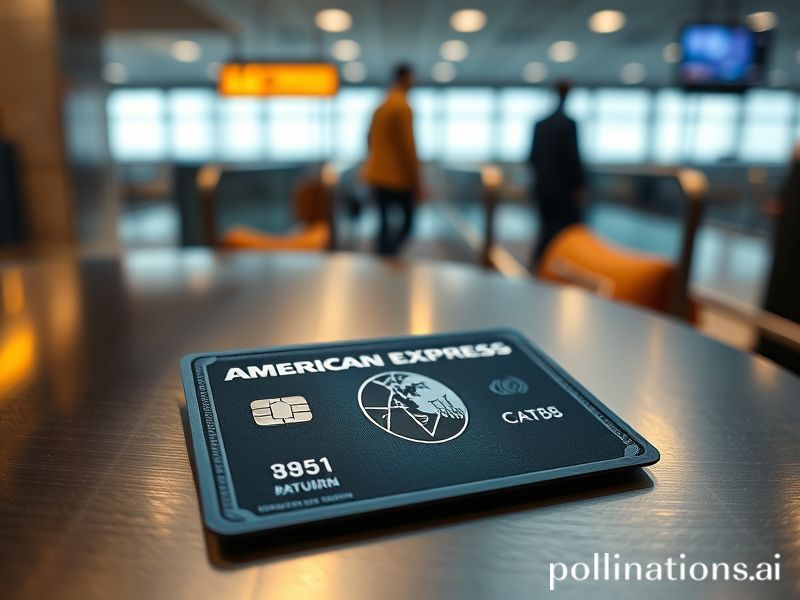American Express: The Global Elite’s Velvet-Shackled Credit Card of Choice
American Express: The Green-Card Colossus That Runs on Champagne and Existential Dread
By the time you land in Singapore, the flight attendants have already whispered to one another that your Platinum card is the only thing standing between you and a complimentary extra peanut. From the marble atrium of Heathrow Terminal 5 to a yak-butter tea tent on the Tibetan plateau, AmEx is there—quietly charging 2.7% on every transaction, like a polite vampire that asks before it bites.
Globally, the company’s three syllables have become shorthand for a peculiar form of capitalist absolution: spend enough, and you can pretend the planet isn’t warming at 1.2°C per decade. The Centurion Lounges—those glassy temples of artisanal charcuterie—now outnumber UNESCO World Heritage sites in 17 countries, a statistic the marketing team will never tweet. Inside, hedge-fund analysts from Zürich queue for quinoa next to Nairobi tech bros who’ve just mortgaged their seed rounds for a hit of complimentary Veuve Clicquot. The bartender, who holds a PhD in comparative literature, pretends not to notice that everyone is photographing the same cocktail to prove they’re still alive.
In geopolitical terms, AmEx functions as a soft-power extension cord for the United States, plugging emerging-market elites into the same rewards algorithm that once pampered Manhattan advertising executives. When a São Paulo fintech founder flashes his Gold card at a ramen pop-up in Shibuya, he isn’t merely buying noodles; he’s buying a micro-dose of American exceptionalism, distilled into 1.5% cash-back and an airport escort who calls him “Mr. Silva” without irony. The transaction is so smooth that neither side has to acknowledge the interest rate, the carbon footprint, or the fact that the card was printed in a factory whose workers have never seen frequent-flyer miles in their lives.
Meanwhile, regulators in Brussels stroke their chins over antitrust filings the way medieval monks once debated the number of angels on a credit limit. The European Commission worries that AmEx’s “closed loop” network—where the company is simultaneously card issuer, network, and bouncer at the velvet rope—might stifle competition. AmEx responds by dispatching lobbyists in bespoke suits to explain that, actually, the loop is more of a lasso helping wayward consumers find fiscal redemption. Everyone nods, pockets an embossed pen, and agrees to revisit the issue sometime after the heat death of the euro.
In India, the Reserve Bank recently ordered AmEx to stop onboarding new customers for violating data-localization rules. The company complied with the wounded dignity of a maharaja asked to queue at his own palace gate. A week later, marketing emails resumed—“We’re working around the clock to welcome you back,” they cooed, as though the RBI had merely misplaced the guest list for a particularly exclusive Diwali party. Indian consumers, seasoned by demonetization and UPI, shrugged and went back to QR codes that don’t judge them for ordering extra cheese.
Yet for all the cynicism, AmEx still performs one useful global service: it keeps the ultra-wealthy distracted. While oligarchs chase Platinum perks, they’re marginally less likely to buy elections or start wars. A lifetime spent obsessing over airline status tiers is, in its own decadent way, a form of non-violent resistance. Every hour a dictator’s son spends arguing over lounge access is an hour he isn’t laundering state funds through a shell company in the Caymans. The card, then, is not just a payment mechanism; it’s a very expensive pacifier for adults who never learned to share.
At 3 a.m. in Dubai, the call centers hum with Filipino agents trained to reassure frantic cardholders that, yes, the charge for a last-minute seaplane to Mykonos was authorized. Somewhere in the static, a junior analyst in Phoenix flags the transaction as “lifestyle inflation risk.” The algorithm sighs—if code could smoke, it would light a cigarette—and approves the limit increase. After all, the world’s spinning toward either utopia or bankruptcy, and American Express has hedged its bets on both.







